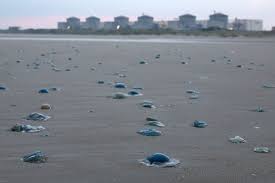
Jellyfish swarm forces shutdown of French nuclear power plant

 :
| Updated On: 12-Aug-2025 @ 12:15 pm
:
| Updated On: 12-Aug-2025 @ 12:15 pmSHARE
Four reactors at Gravelines, one of France’s largest nuclear power plants, were shut down after a massive swarm of jellyfish clogged the filters of the plant’s water pumping stations, according to French energy group Electricité de France (EDF). Three reactors shut down automatically on Sunday evening, followed by the fourth on Monday morning. EDF stressed there was no danger to the plant, its staff, or the environment. The shutdowns were triggered by the “massive and unpredictable” influx of jellyfish into the filter drums, which are part of the cooling system.
Located on the English Channel in northern France, Gravelines is cooled via a canal connected to the North Sea. EDF teams began safety inspections to allow a restart, with the reactors expected to come back online on Thursday.
In recent years, beaches around Gravelines—between Dunkirk and Calais—have seen a rise in jellyfish numbers due to warming waters and the arrival of invasive species. The Bulletin of the Atomic Scientists noted in 2021 that jellyfish-related shutdowns of nuclear plants are not new, and such events have caused significant economic losses.
Scientists are now exploring prevention measures, such as using drones to track jellyfish movements to allow early intervention. Warmer waters accelerate jellyfish breeding, and climate change is extending their reproductive seasons. According to Derek Wright, a marine biology consultant with the US National Oceanic and Atmospheric Administration, warming seas like the North Sea provide ideal conditions for jellyfish proliferation.
Jellyfish can also travel long distances via tanker ships, entering ballast tanks in one port and being released in another far across the globe. An invasive species called the Asian Moon jellyfish, native to the Pacific Northwest, was first reported in the North Sea in 2020. This species prefers calm, plankton-rich waters found in ports and canals and has caused similar shutdowns in China, Japan, and India.
EDF stated that it did not know the species involved in this latest incident. Such shutdowns are rare for EDF, with the last one occurring in the 1990s. However, there are notable international examples, such as a three-day nuclear plant closure in Sweden in 2013 and a major power reduction at a Japanese plant in 1999 due to jellyfish swarms.
Experts cite overfishing, plastic pollution, and climate change as major contributors to the global jellyfish boom. Overfishing removes natural predators, plastic provides surfaces for jellyfish larvae to attach to, and warming seas enhance their breeding success.
EDF assured that there would be no electricity shortage as a result of the shutdown. Other power sources, including solar energy, remain active and capable of meeting demand.
This incident highlights the vulnerability of coastal nuclear facilities to natural marine disruptions and the increasing likelihood of such events in a warming, human-altered marine environment. It also underscores the need for better monitoring and rapid-response strategies to prevent costly and potentially dangerous shutdowns caused by ecological changes.